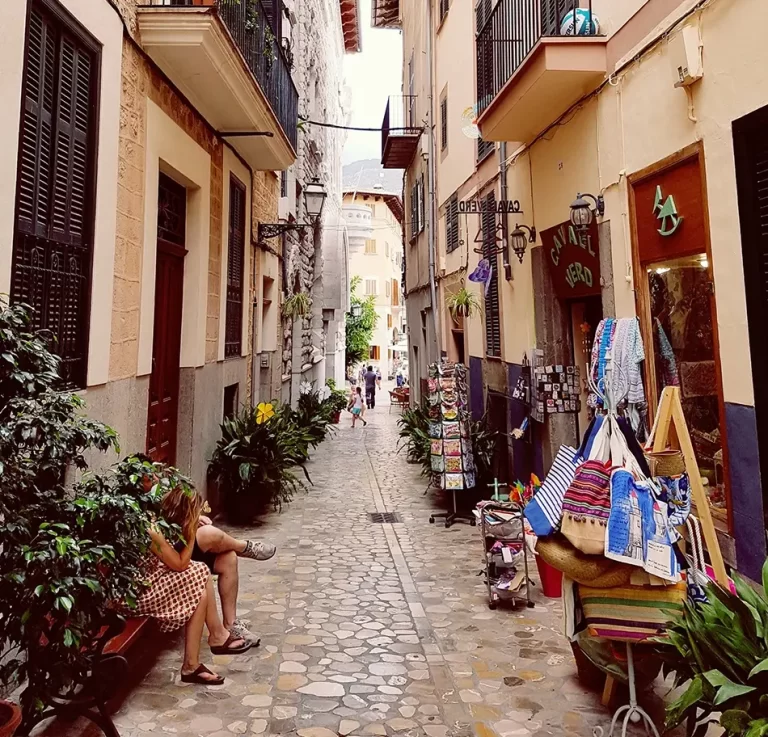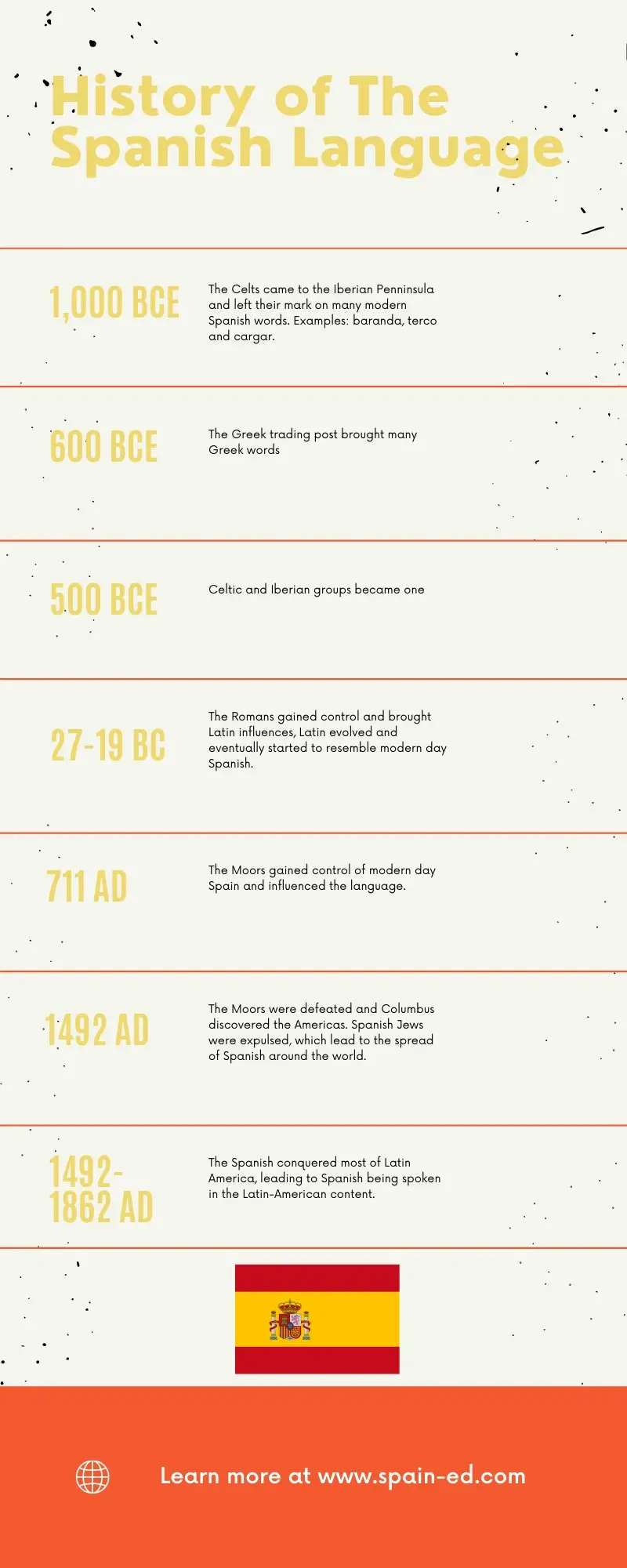
Language in Spain
Things you didn't know about Languages in Spain
Spanish is the most widely spoken language in Spain. In fact, one of the best ways to learn Spanish is by visiting and staying in places like Barcelona or Madrid. And while you can learn Spanish with some time and focus, the topic of Language in Spain is a lot more complicated than just Spanish. Aside from using Spanish as a federal language, there are many regions that use other languages officially alongside Spanish.
To help you better understand how language in Spain works, this article will give you a run-down of:

Where the Spanish language comes from
The Spanish language has a long history that dates back to when the Roman Empire conquered the Iberian Peninsula. At its core, Spanish is a Romance language, which means that it shares its origins with languages like Italian, French, and Romanian. Alongside these, you’ll also find other Romance languages in Spain such as Catalan and Galician. In Barcelona people even speak 2 languages!

Today, you can draw a straight line from the Latin spoken in Spain hundreds of years ago to the Spanish of today. Spanish started out when the Romans took over and Latin was spoken with certain words mixed in from local languages. Over time, this variety of Latin that was spoken on the Iberian changed its grammar and pronunciation and split off and evolved into different Romance languages. These include Old Spanish as well as the precursors of Catalan, Portuguese, and other related languages. The Old Spanish language continued to change and also took on some influence from Arabic in the Middle Ages. It was around the 15th century that Old Spanish began to change further and become much closer to the language we know today. Now Spanish is spoken by more than 300 million people around the world and used officially by more than 20 countries.
Spain’s Many Languages
While Spanish is certainly the foremost language in Spain, there are many regions and municipalities throughout the country that recognize and use other languages. Many of these regional languages are considered co-official in their respective regions. Probably one of the best-known examples is in Catalonia where Catalan is the co-official language alongside Spanish.
So how many languages does Spain have then?
Quite a few actually. Aside from Spanish, you’ll find five different languages who have the status of co-official in different regions. In addition to these five, there are also three other languages that are formally recognized. Howeve these are not officially used in any region. In total that means that Spain has nine languages that are recognized by the government. So you can see how language in Spain has more a lot more diversity than just saying Spanish and calling it a day.
Which languages you’ll find in Spain
Aside from Castellano (Spanish), you’ll also hear different languages depending on which part of the country you’re in. This should give you a quick overview of the major lenguas de España (languages of Spain) so that you’ll know what to expect when you visit.
It’s important to understand that each of these is used in different ways and in different settings. Some are used in education and government speeches while others are primarily spoken in the countryside or the kitchen. Aside from that, the relationship that people have with each language can differ depending on where a person is from, their age, and their family. So when you learn about language in Spain, keep these relationships in mind when travelling or visiting different Spanish cities or regions.
Catalan and Valencian
Catalan is the second-largest language spoken in Spain by far. With more than 10 million speakers, you’re bound to hear it when traveling in Catalonia, so keep your ears ready if you are visiting Barcelona or Valencia.
You might also hear Valenciano (Valencian) spoken as well. This is the official name of the local language spoken in the region of Valencia, although many speakers consider it to be a local variety of the Catalan language called by another name.
While Catalan and Spanish share a common ancestor, the language is actually more closely related to French. As such, it sounds quite different from Spanish and uses a lot more consonant clusters.
Galician (Galego)
Galician is the third-largest native language spoken in Spain. You’ll find Galician most easily in the province of Galicia where by law, it’s the first language of the local administrations and governments. There are also Galician-speaking communities throughout the country. Currently, there are about 2,4 million Galician speakers throughout Spain.
Listening to the Galician language, you might notice a similarity to Portuguese. This isn’t by chance! In fact, the two languages are closely related and even share a common ancestor known as Galician-Portuguese.
Basque
Of all the languages in Spain, Basque is probably the most unique. In terms of grammar, vocabulary, and structure, Basque is something of a linguistic mystery. Unlike the other languages of Spain, Basque doesn’t come from Latin. It’s a language isolate with no known language relatives or relations. This partially explains the language’s unusual grammar and word order that’s completely different from any neighboring Romance language.
Today the Basque language is undergoing a sort of renaissance with 750,000 speakers in Spain and growing. Aside from Spain, you’ll also hear Basque spoken across the border in the French Pyrenees. This means that you can hear and see some Basque when traveling through places like San Sebastian and Bilbao.
Aranese
The smallest co-official language is Aranese with only a few thousand speakers. Linguistically speaking, Aranese can be described as the variety of the Occitan language that’s spoken in Spain.
Recognized Languages
Language in Spain includes not only Spanish and the five co-official languages mentioned above, but also three languages that are recognized but not considered official anywhere. These are Arustrian, Leonese, and Aragonese. All of these are Romance languages who are closely related to Spanish, though distinct in their own right.
The Asturian and Leonese languages are two very closely related tongues with about 100,000 speakers. Asturian is the only Romance language to use the neuter gender as well as masculine and feminine, which is an old hold-over from its origins in Latin. Aragonese is the smallest recognized language in Spain. Today it’s spoken by about 12,000 people,

Where in Spain people speak something besides Spanish
The country of Spain is divided into seventeen different comunidades autónomas (autonomous communities). These are often referred to as regions in casual speech and function in Spain with a large degree of autonomy. As such, languages are recognized and/or co-official most often on this scale.
While the vast majority of the population of Spain speaks Spanish, the country’s other languages are mostly found in the northern and eastern parts of Spain.
First, let’s go over where you can find the languages that are co-official. In the eastern comunidades autónomas of Catalonia and the Balearic Islands, you find Catalan widely spoken while it’s also used extensively in Valencia, though often referred to as Valencian. Going to the northern area of Spain along the Pyrenees mountains, Basque is spoken and used officially in País Vasco (Basque Country) and Navarre. Just north of Portugal, the region of Galicia is the homeland of Spain’s large Galician population. Aranese is found almost exclusively in the Val d’Aran near the Spanish-French border.
Aragonese primarily in the valleys in the north of the Aragon province. Asturian and Leonese are found in northwest Spain in west parts of the comunidades autónomas of Asturias and Castilla y León respectively.
Conclusion
Today almost everyone in Spain can and does speak Spanish. So you don’t have to worry about learning Basque or Catalan, although picking up a word or two might very well be appreciated. So as you enjoy your journey of learning Spanish in Spain, keep your ears open for everything!
When it comes to language in Spain, there’s a lot more than just Spanish. Learn about Spain’s official languages like Catalan and Basque.
No, Spanish is the official language of the country, but many regions have other official languages.
Most of Spain’s other languages are spoken in the northern and eastern parts of the country.
No. Most of the languages spoken in Spain come from Latin, however the official language of two regions, Basque, is totally unrelated to these.